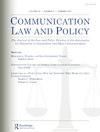界定记者在欧洲人权法院进行新闻采访的自由:对《欧洲人权公约》第10条的报道采取更基于人权的方法的一步?
IF 0.2
Q4 LAW
引用次数: 0
摘要
在欧洲人权法院(ECtHR),作出回应的各国政府经常辩称,“言论自由”(第10条)的权利不适用于案件,因为记者收集信息的方法有争议(如窃听、秘密录音、使用化名和其他方法)。本文探讨了欧洲人权法院的国际裁决如何考验新闻自由的界限。这表明,对于欧洲人权委员会来说,考虑有关新闻采编的广泛的、有原则的自由的可诉性是一个共同的人权问题。通过对过去二十年中27个案例的概念性法律研究,本文的分析重点是围绕《欧洲人权公约》第10条第1款关于成员国行为的范围的标准。有人认为,欧洲人权法院界定新闻采编和调查性新闻自由的方式对法律确定性构成了不适当的挑战,因为它过于倾向于包括与新闻伦理或“职责”相关的广泛因素,例如记者行为的合法性。这篇文章主张,欧洲人权公约第10条需要更多以人权为基础的内容。本文章由计算机程序翻译,如有差异,请以英文原文为准。
Scoping the Journalists’ Freedom to Conduct Newsgathering at the European Court of Human Rights: A Step Toward a More Human Rights-Based Approach to the Coverage of ECHR Article 10?
At the European Court of Human Rights (ECtHR), responding governments often argue that the right to “Freedom of expression” (Article 10) does not apply to cases because of journalists’ controversial methods of information gathering (such as wiretapping, secret recording, the use of aliases, and other methods). This article examines how the ECtHR’s international adjudication is a test of the boundaries of the freedom of journalism. It shows that it is a common human rights issue for the ECtHR to consider the justiciability of wide, principled freedoms about newsgathering. Through a conceptual, legal study of twenty-seven cases covering the past two decades, the analysis is focused on the criteria surrounding the scope of ECHR Article 10, paragraph 1, concerning the acts of a member state. It is argued that the way that the ECtHR is defining the contours of the freedom to conduct newsgathering and investigative journalism provides an undue challenge to legal certainty, because it is tending too much towards including a wide range of elements related to either journalistic ethics or “duties,” such as the lawfulness of journalists' conduct. The article advocates that a more human rights-based coverage under ECHR Article 10 is needed.
求助全文
通过发布文献求助,成功后即可免费获取论文全文。
去求助
来源期刊
CiteScore
0.60
自引率
33.30%
发文量
7
期刊介绍:
The societal, cultural, economic and political dimensions of communication, including the freedoms of speech and press, are undergoing dramatic global changes. The convergence of the mass media, telecommunications, and computers has raised important questions reflected in analyses of modern communication law, policy, and regulation. Serving as a forum for discussions of these continuing and emerging questions, Communication Law and Policy considers traditional and contemporary problems of freedom of expression and dissemination, including theoretical, conceptual and methodological issues inherent in the special conditions presented by new media and information technologies.

 求助内容:
求助内容: 应助结果提醒方式:
应助结果提醒方式:


